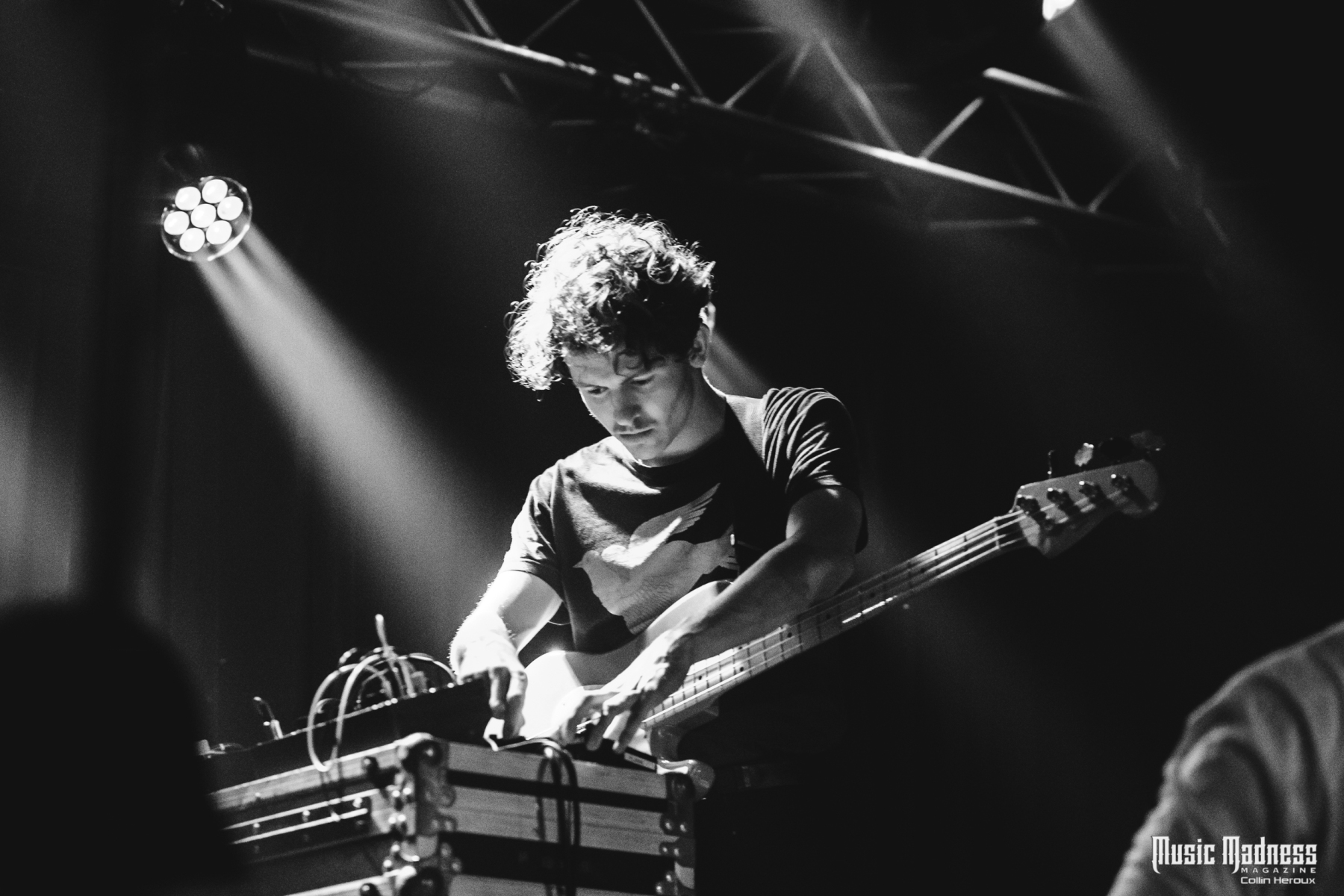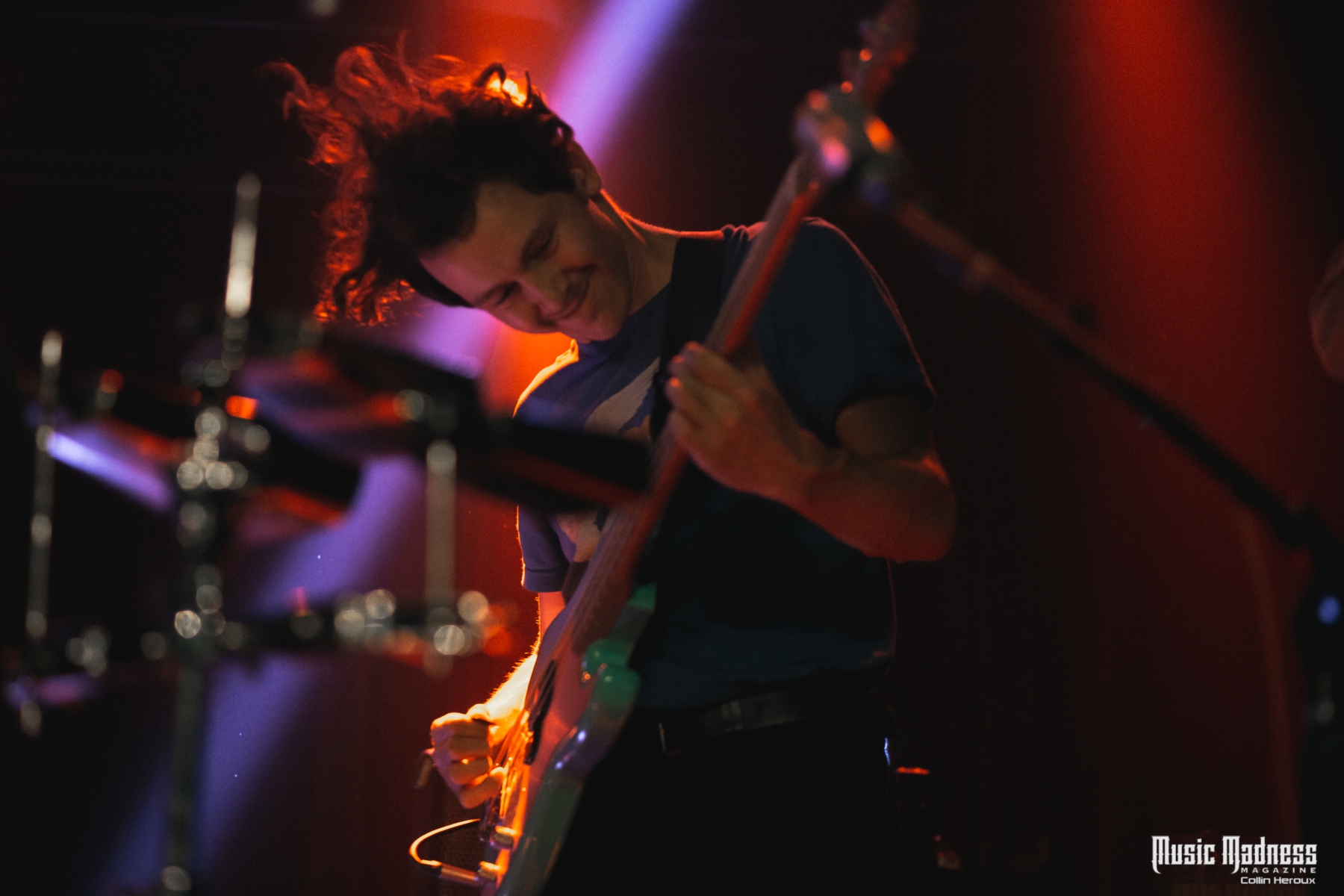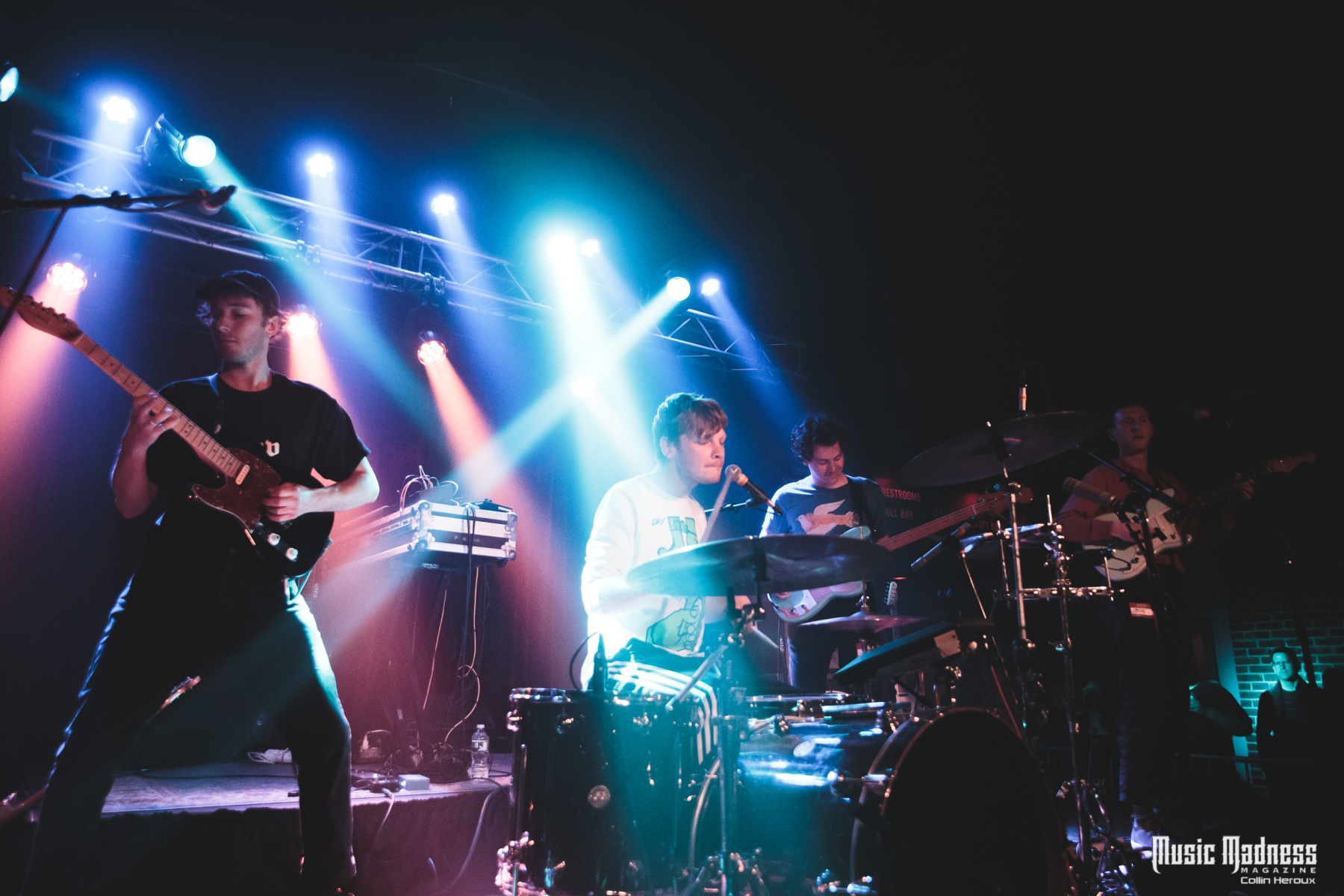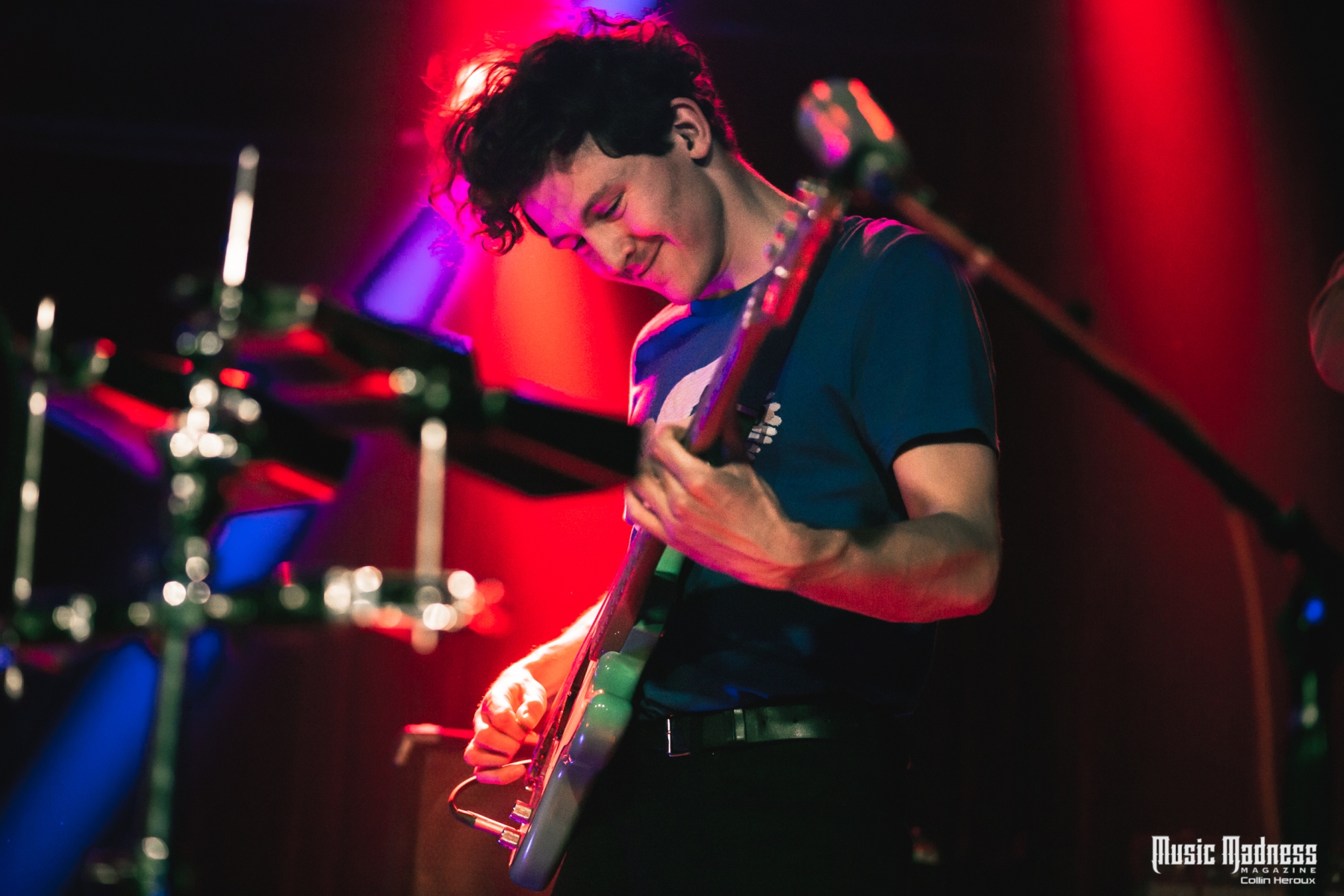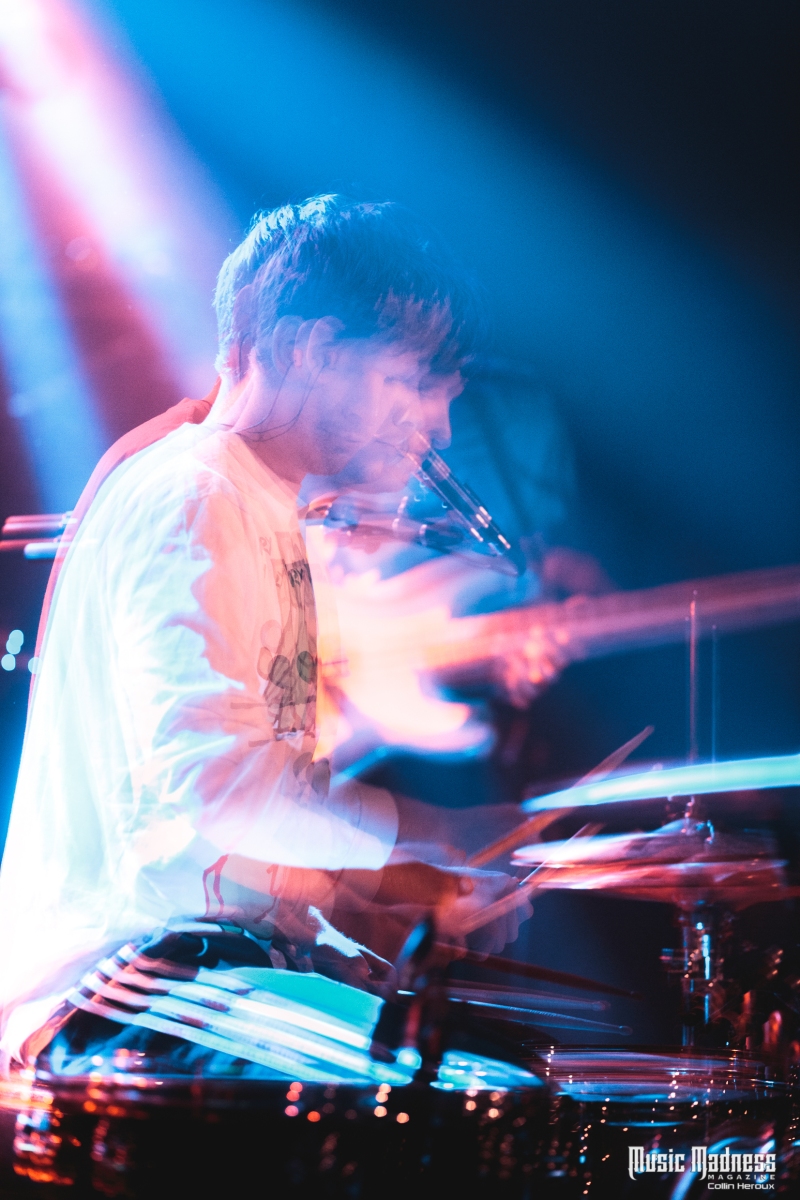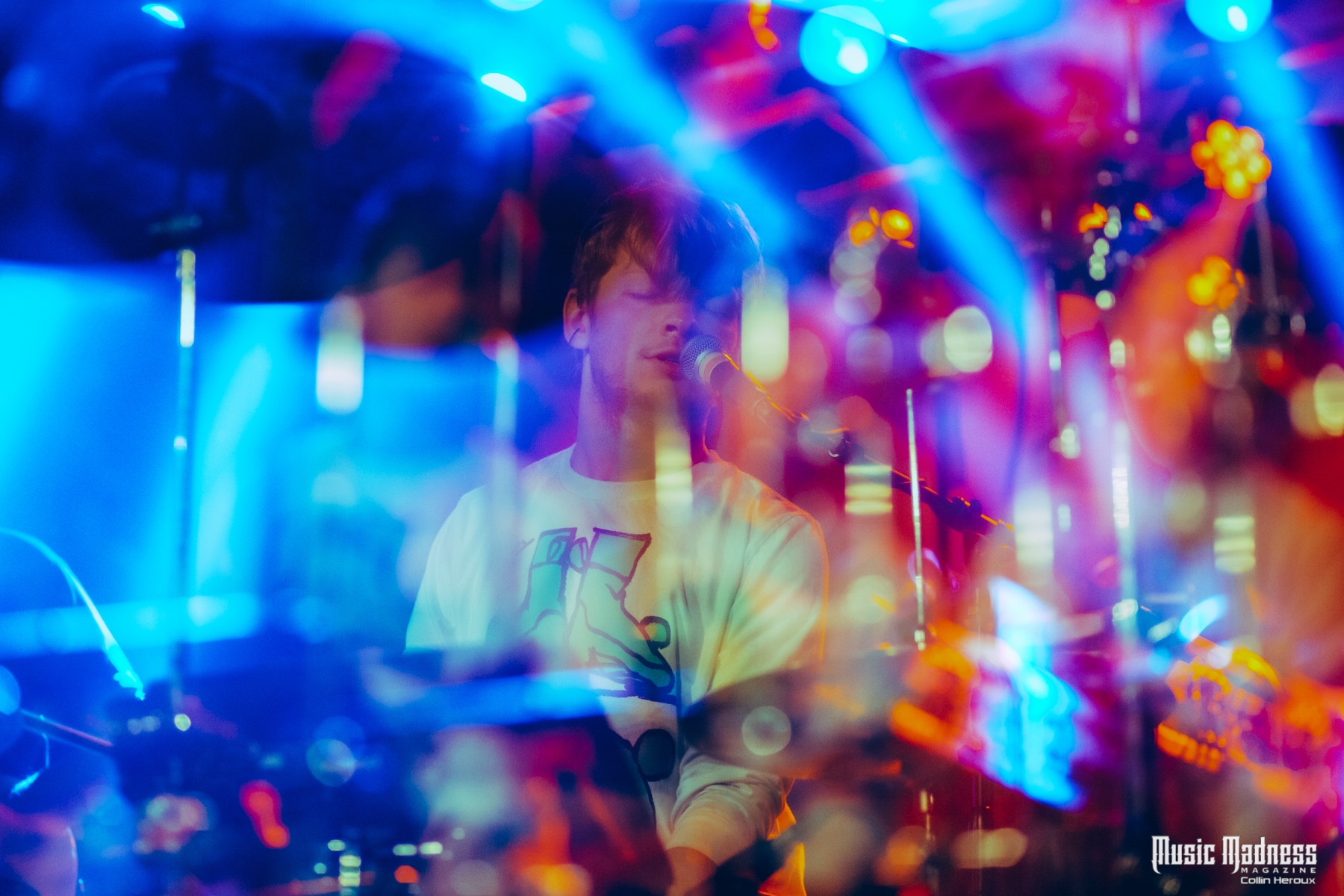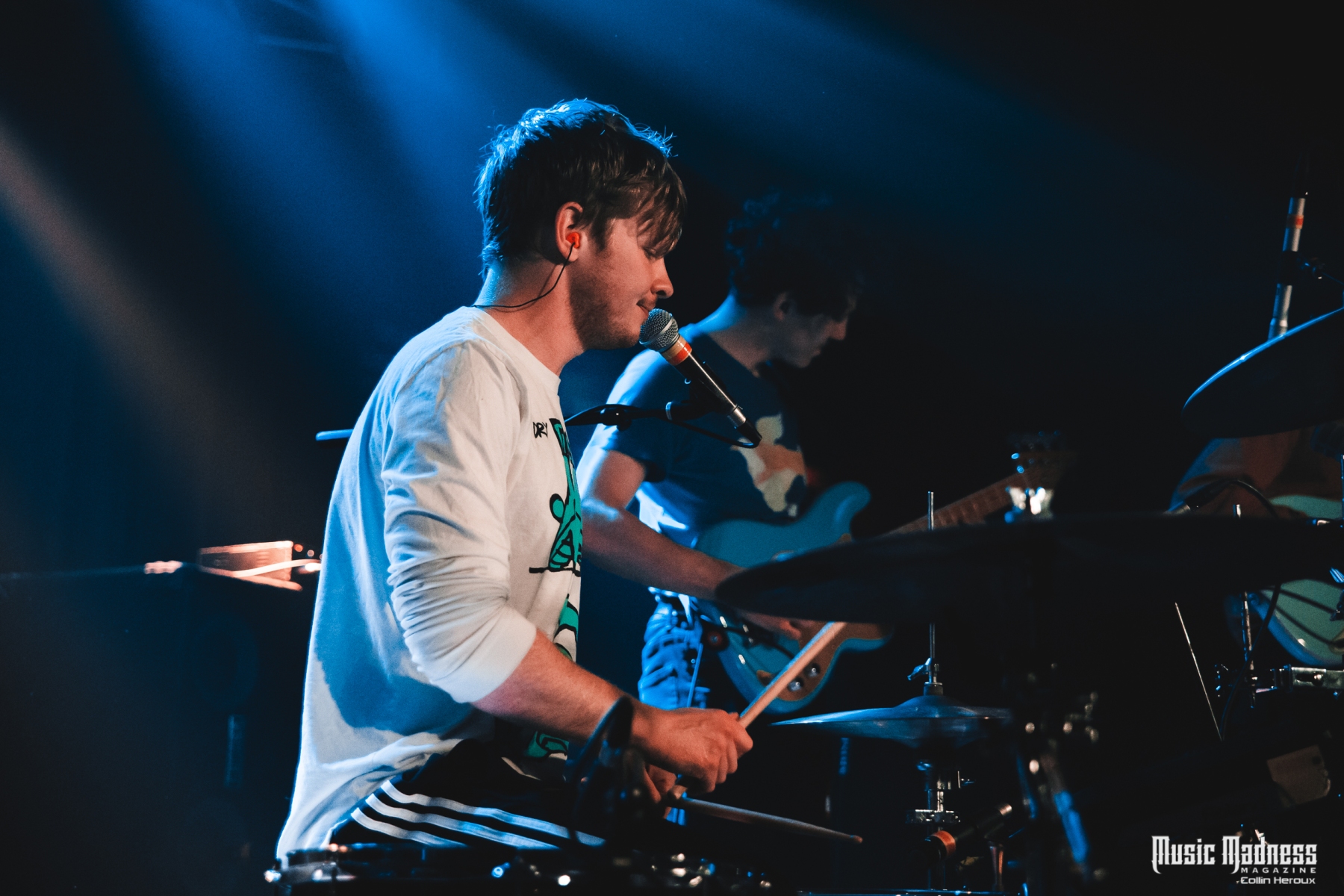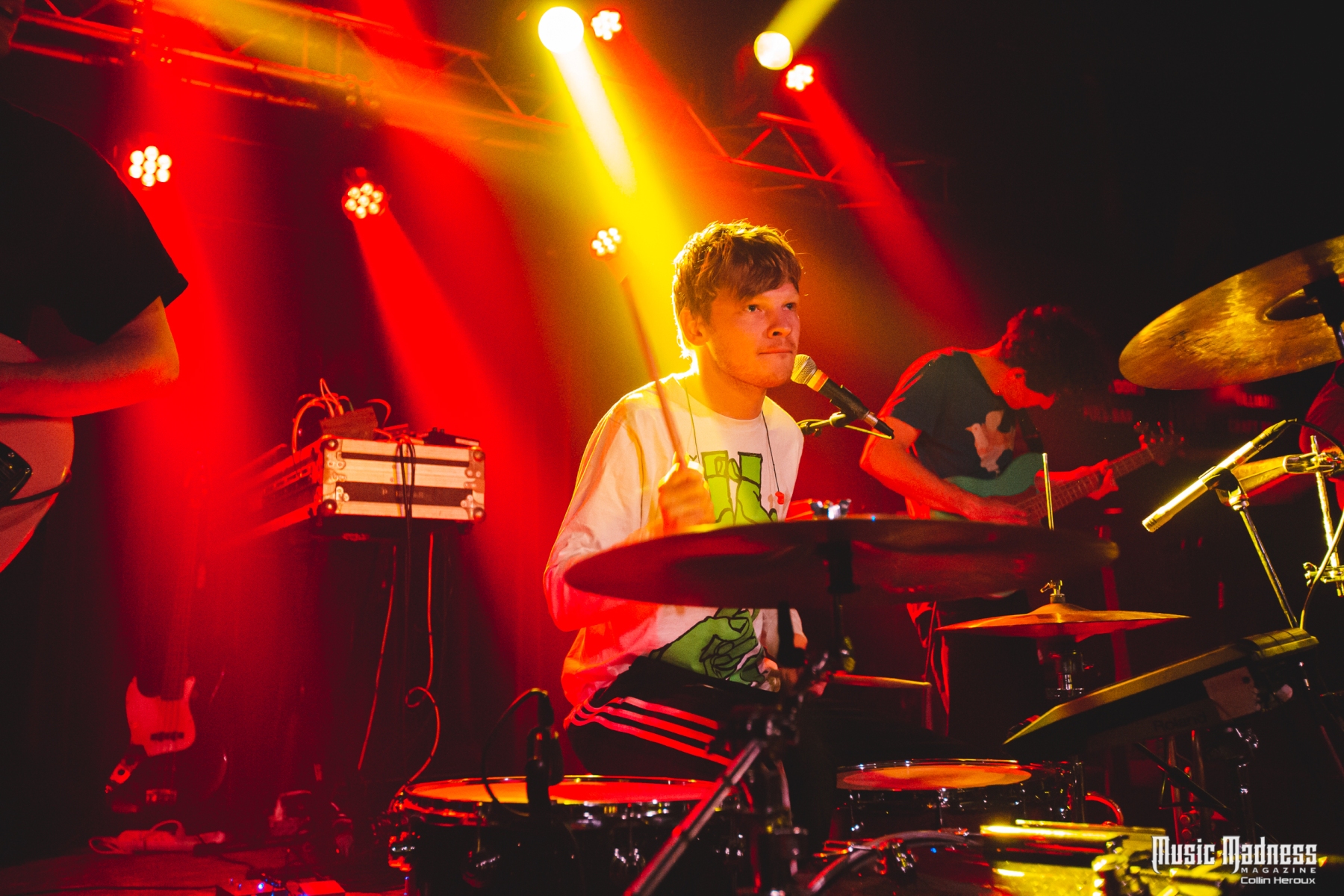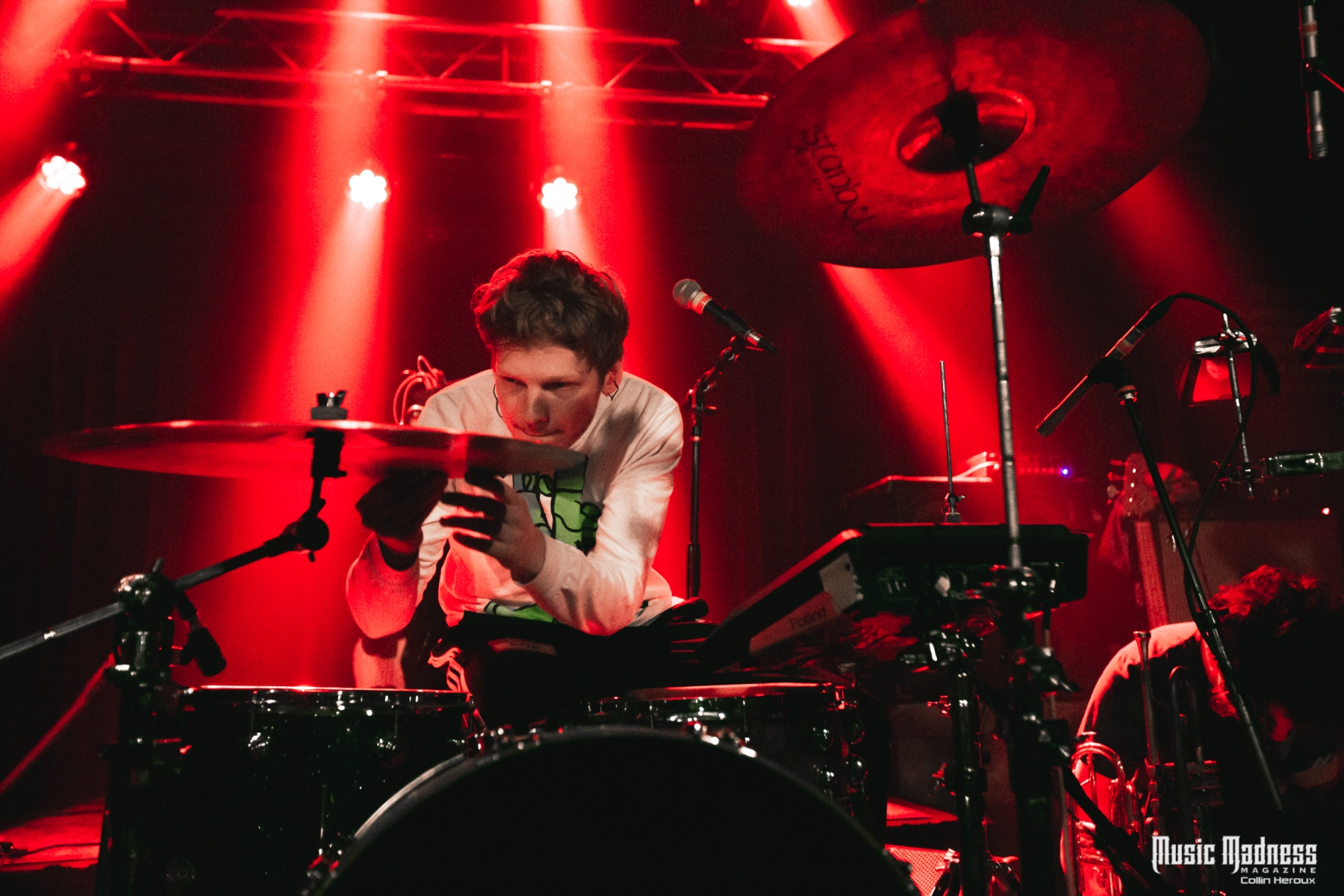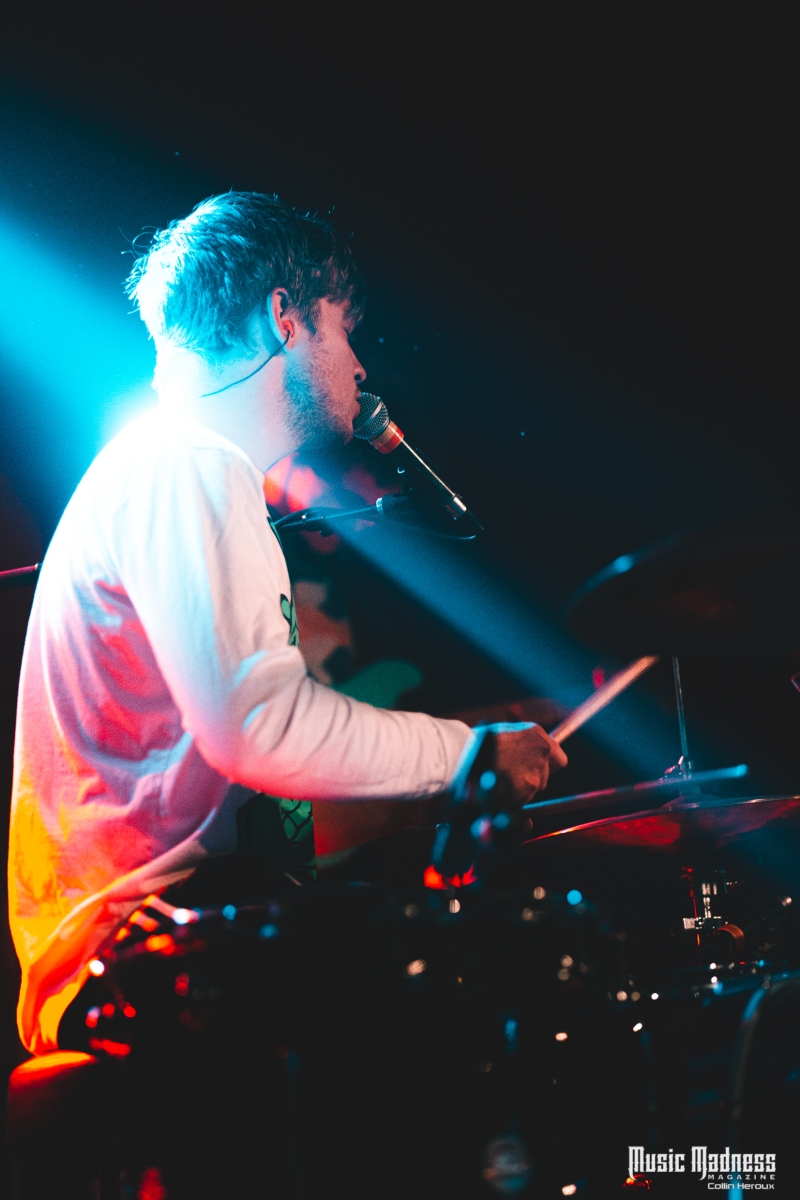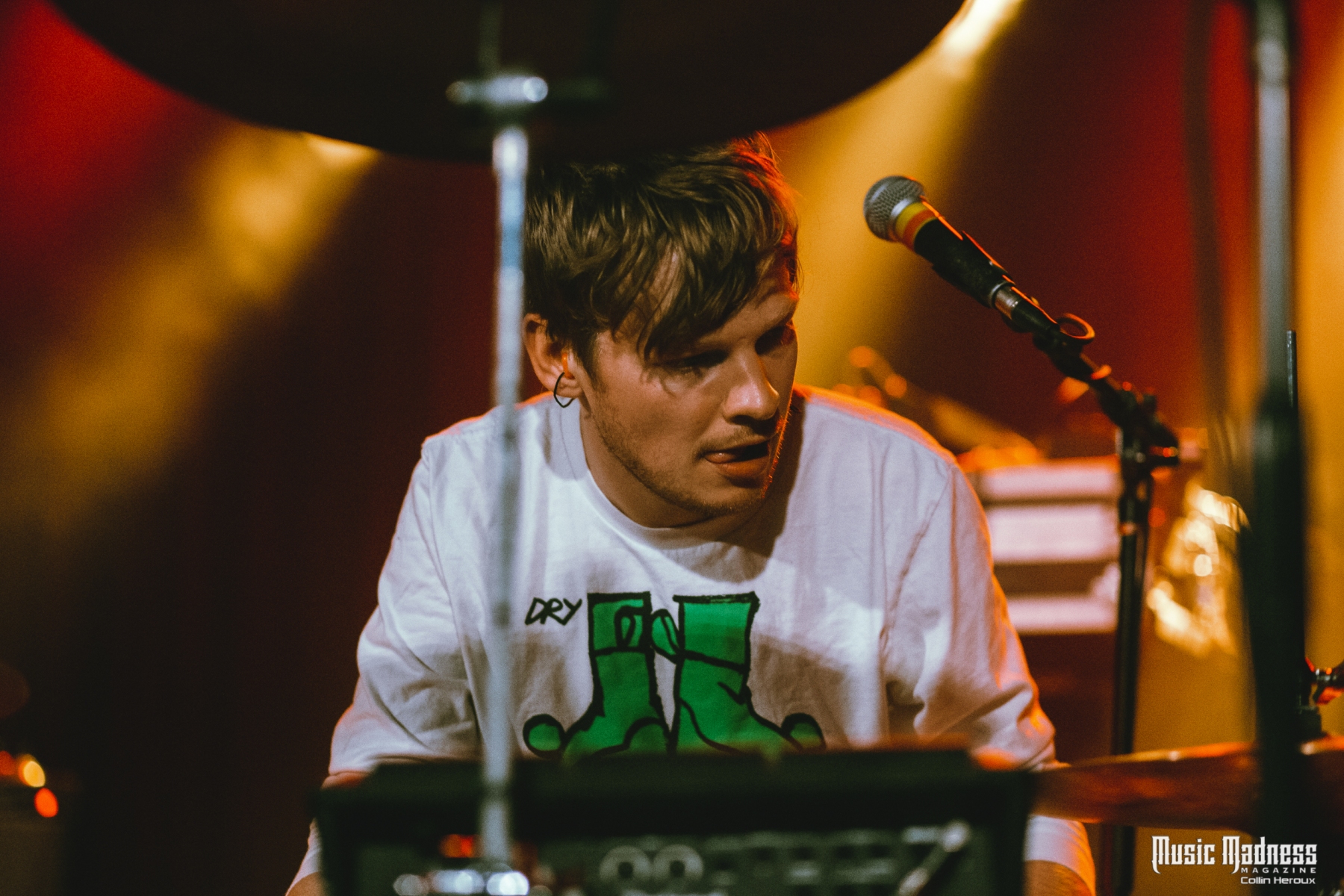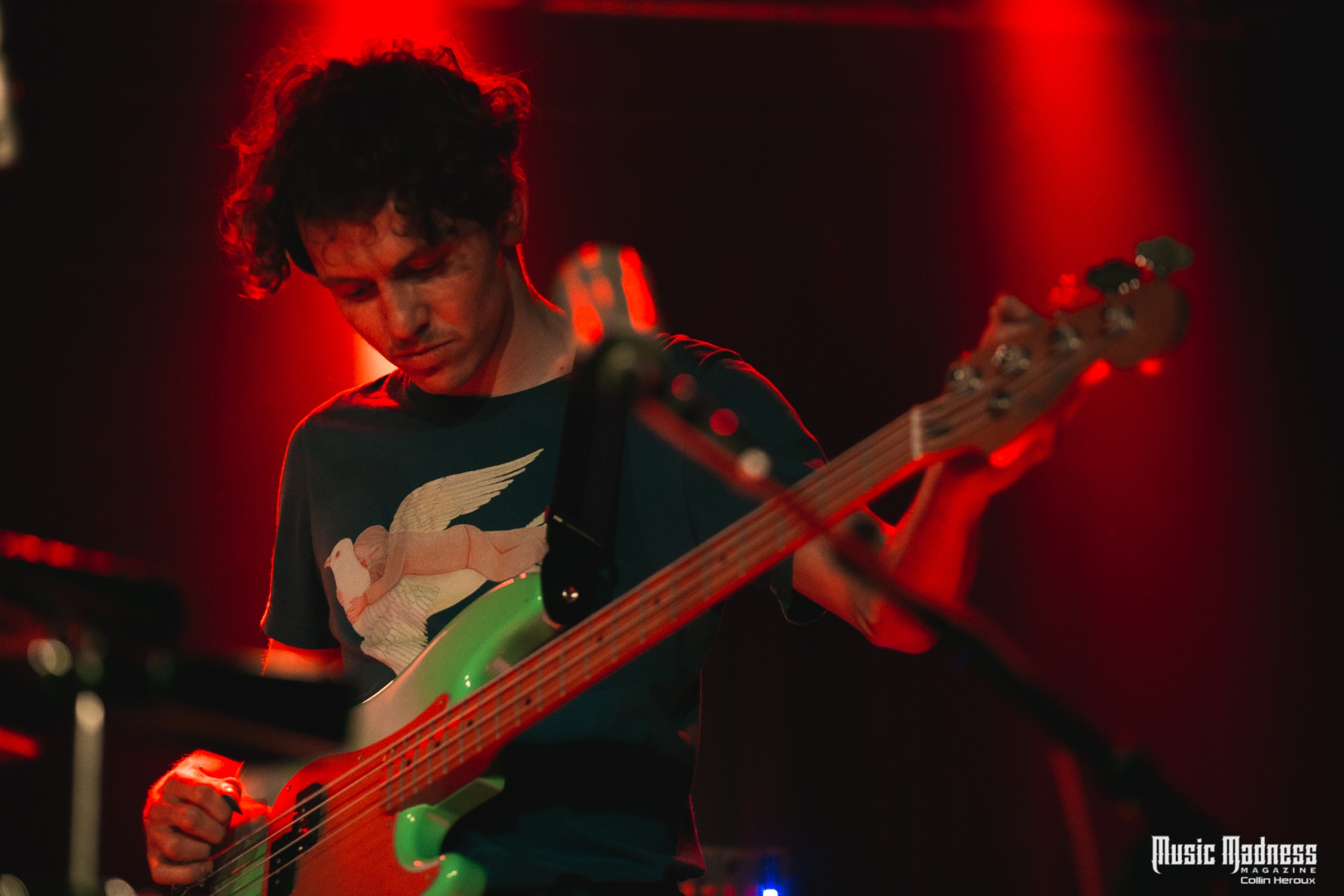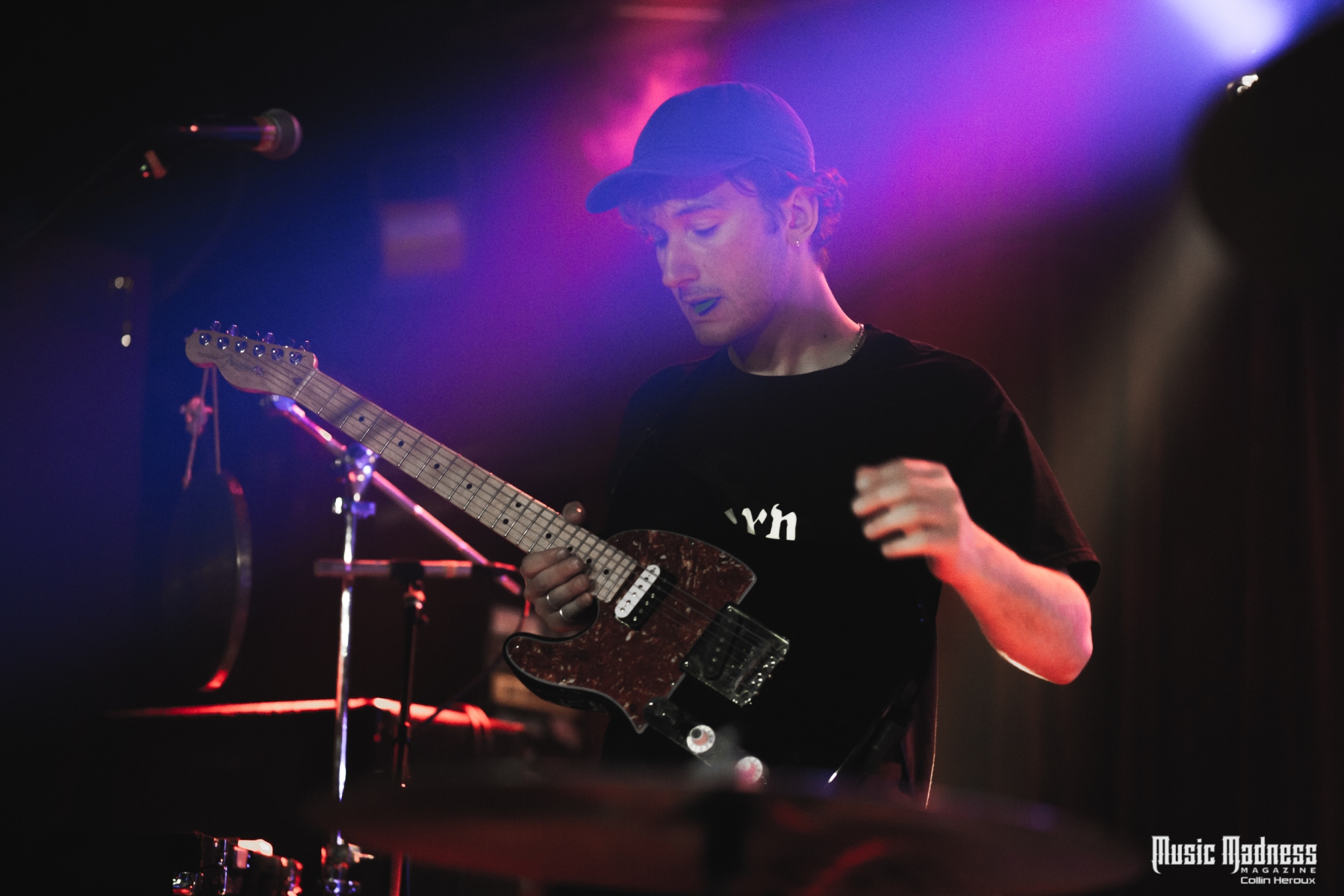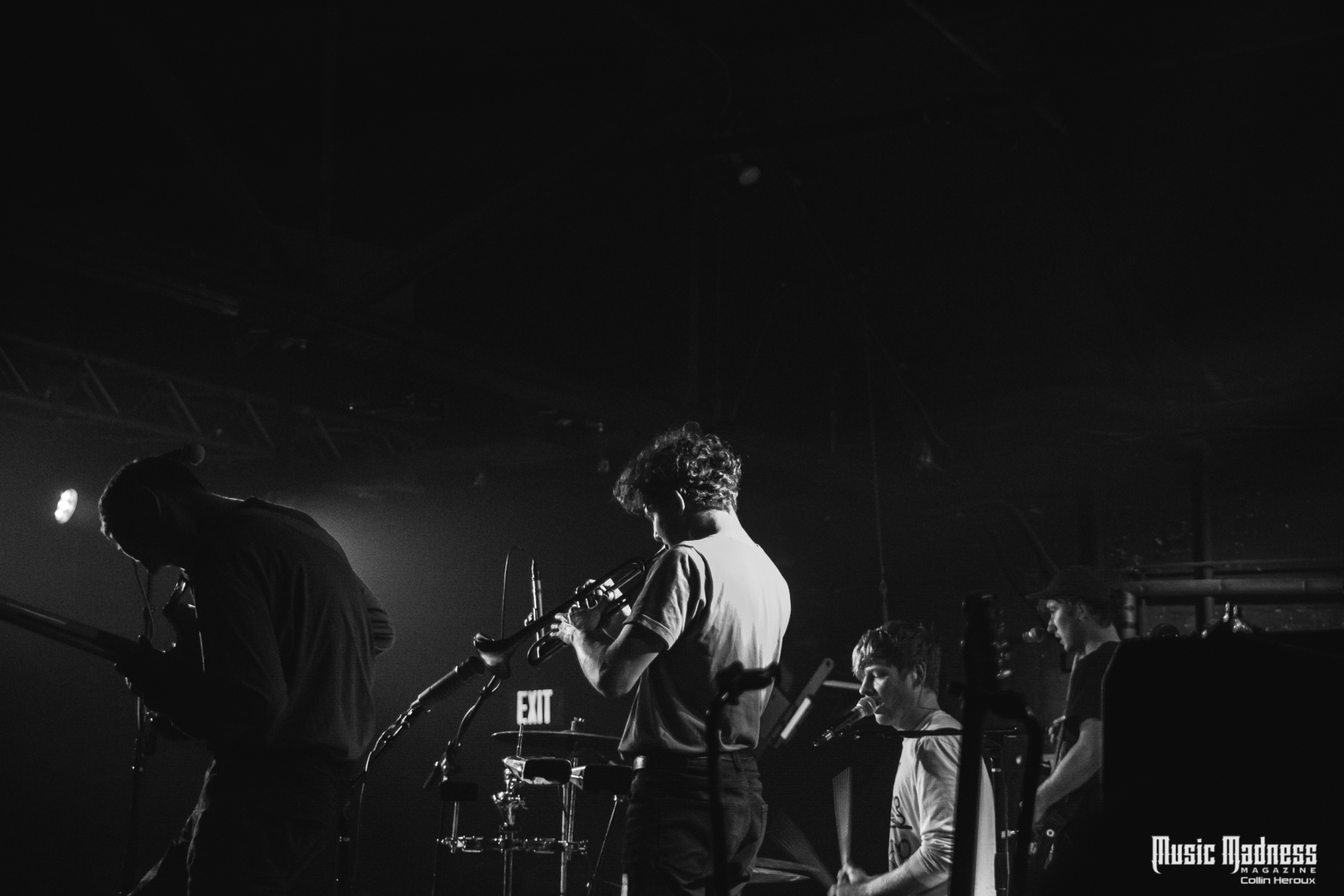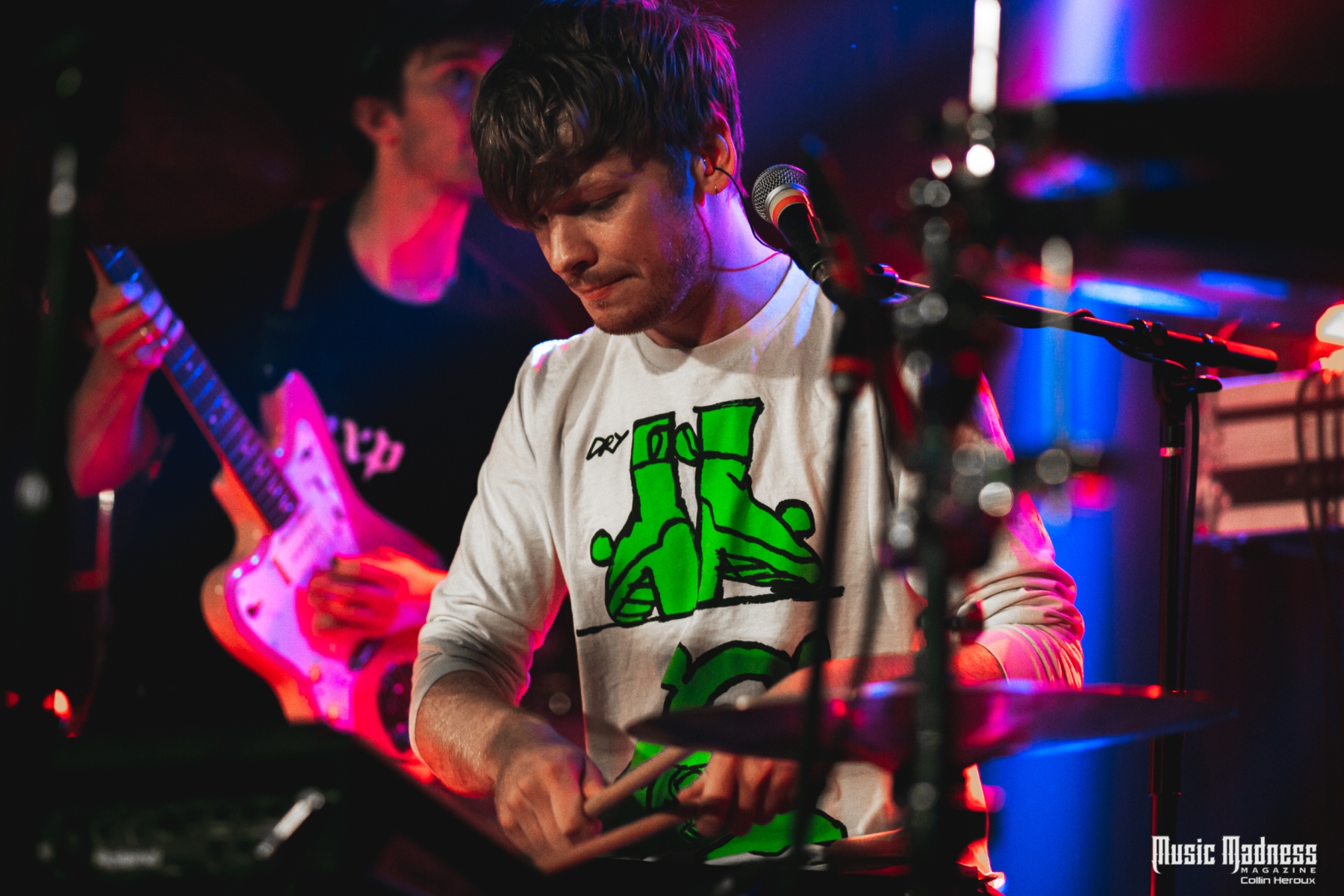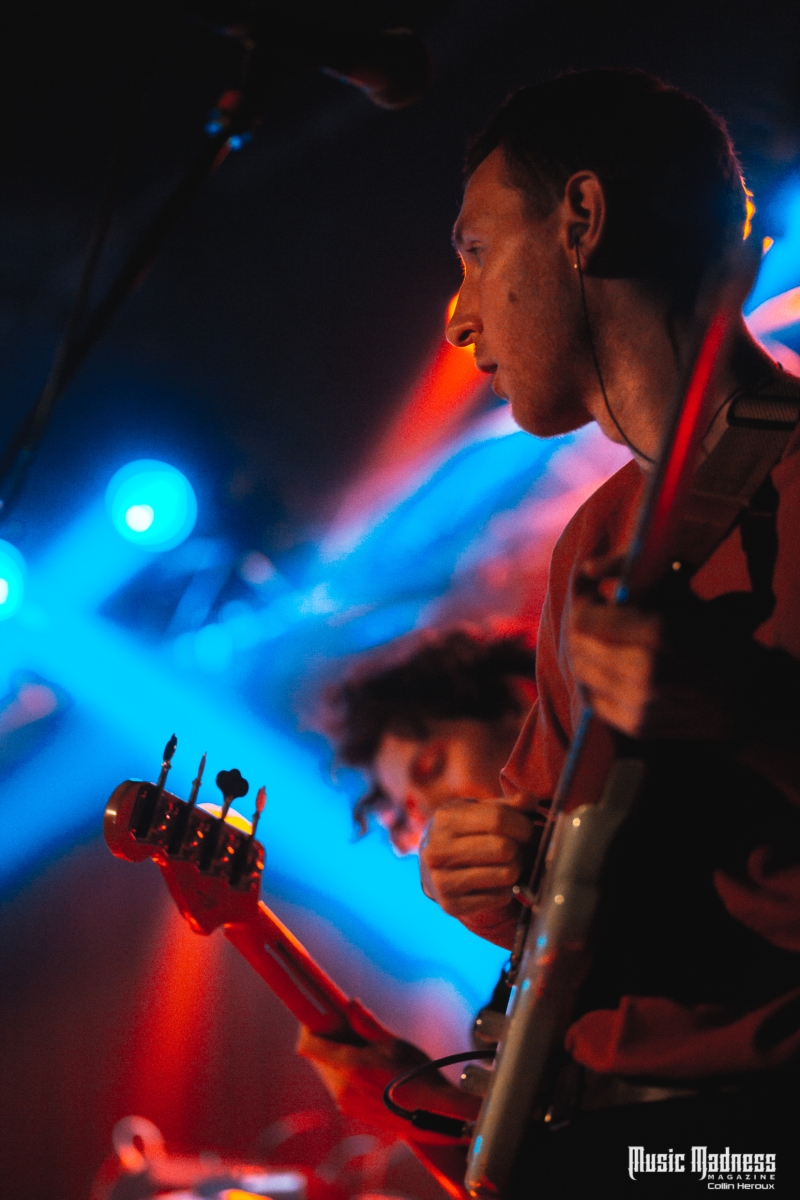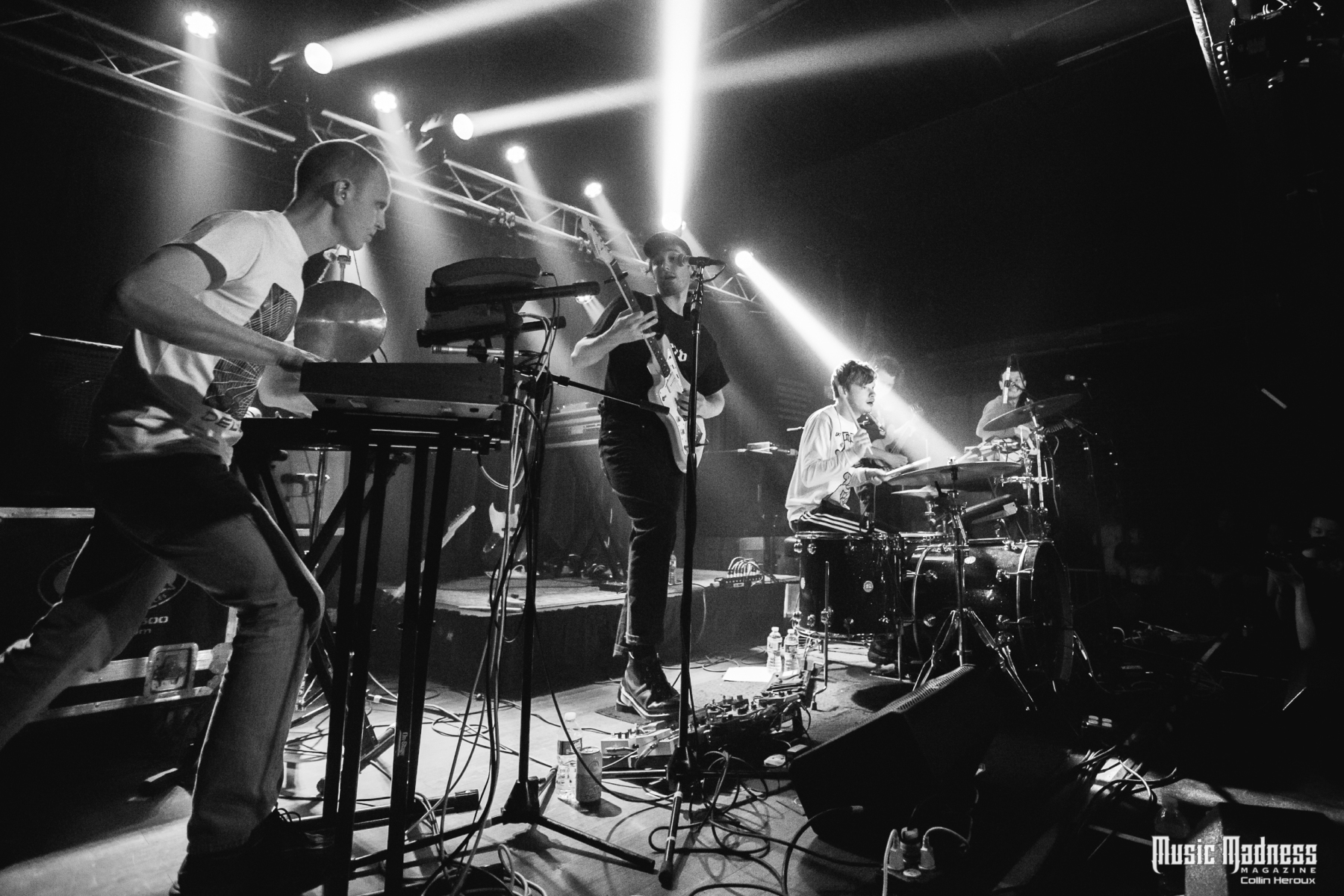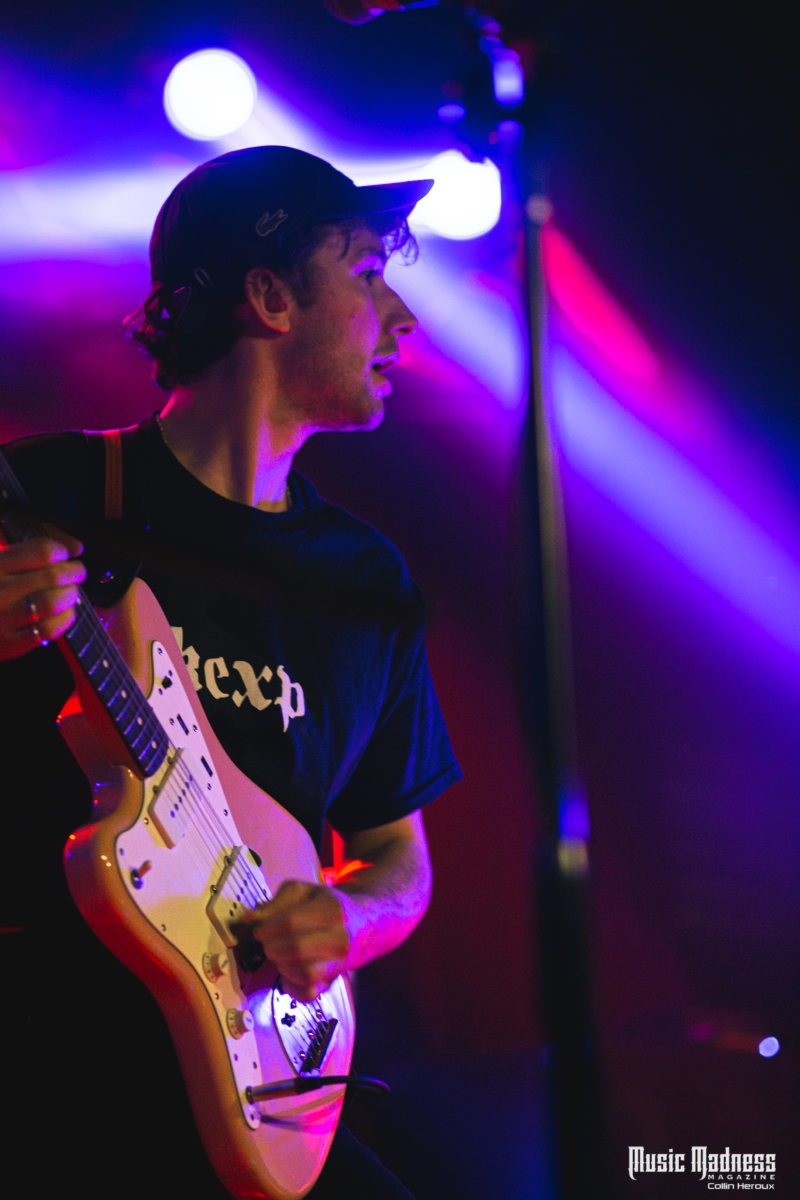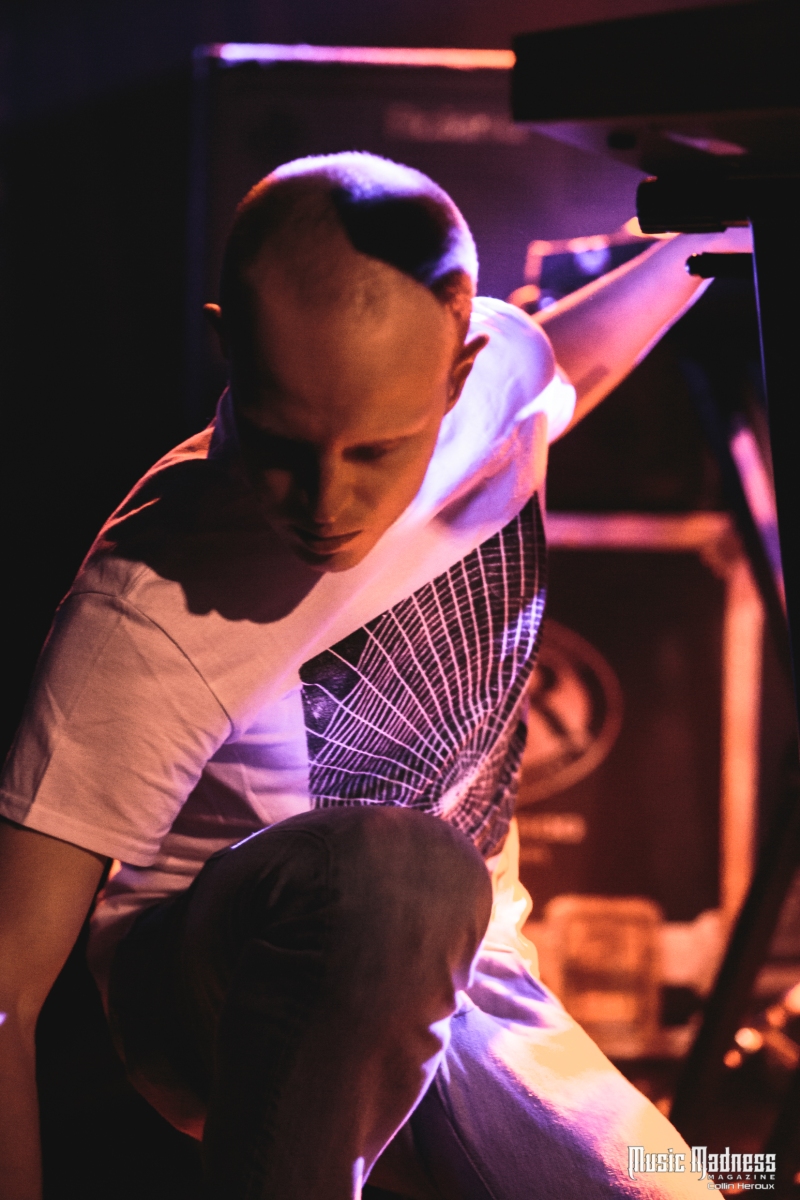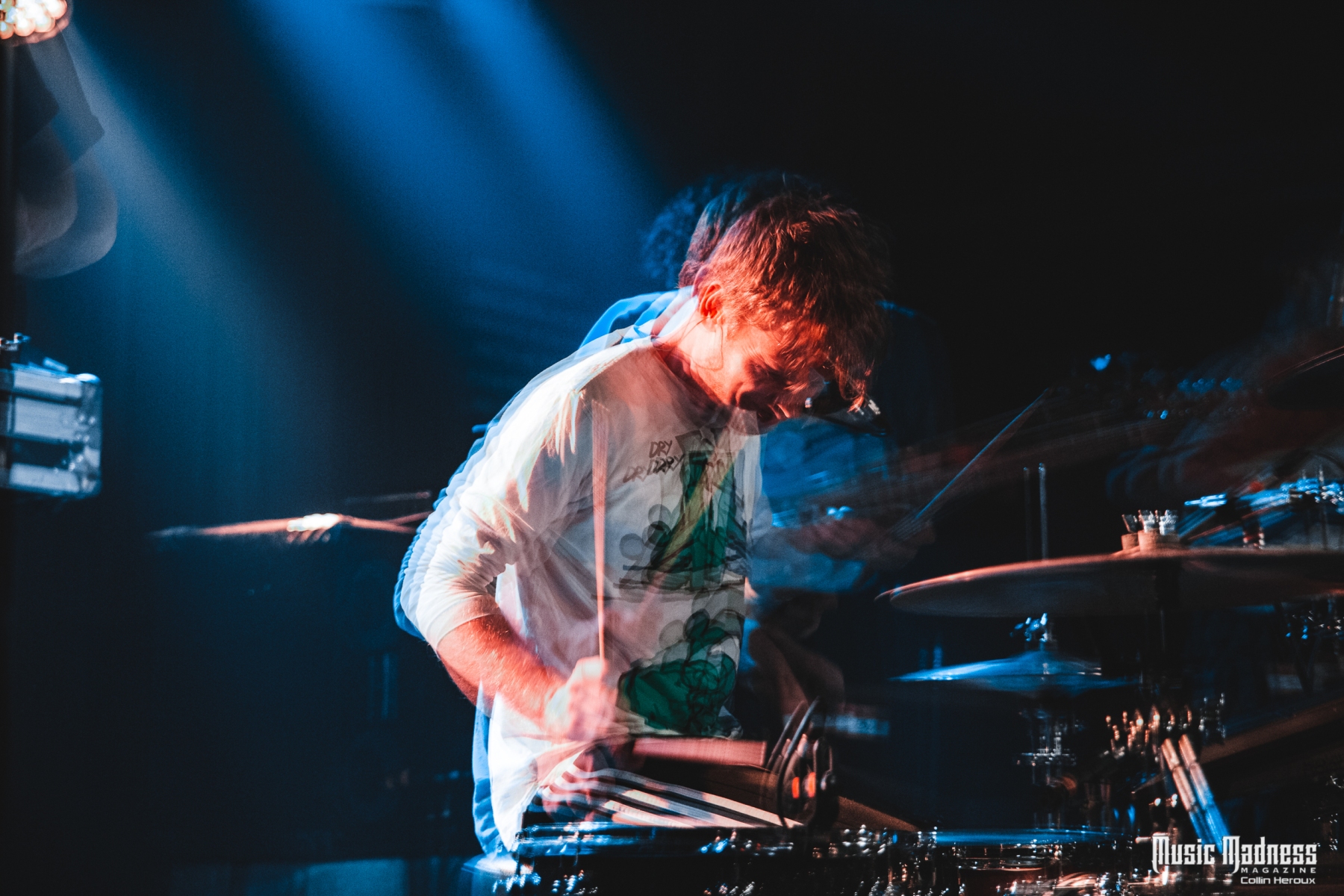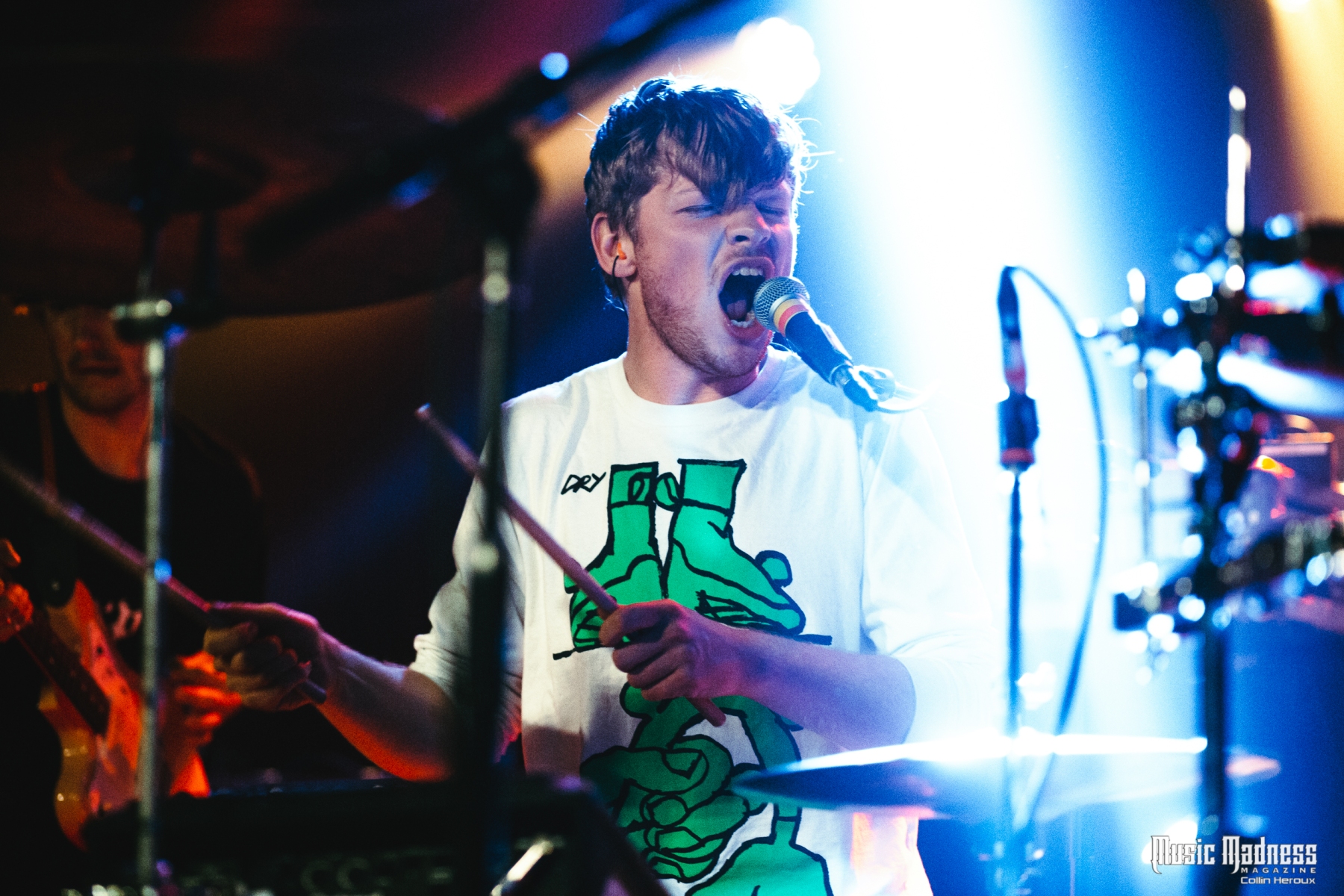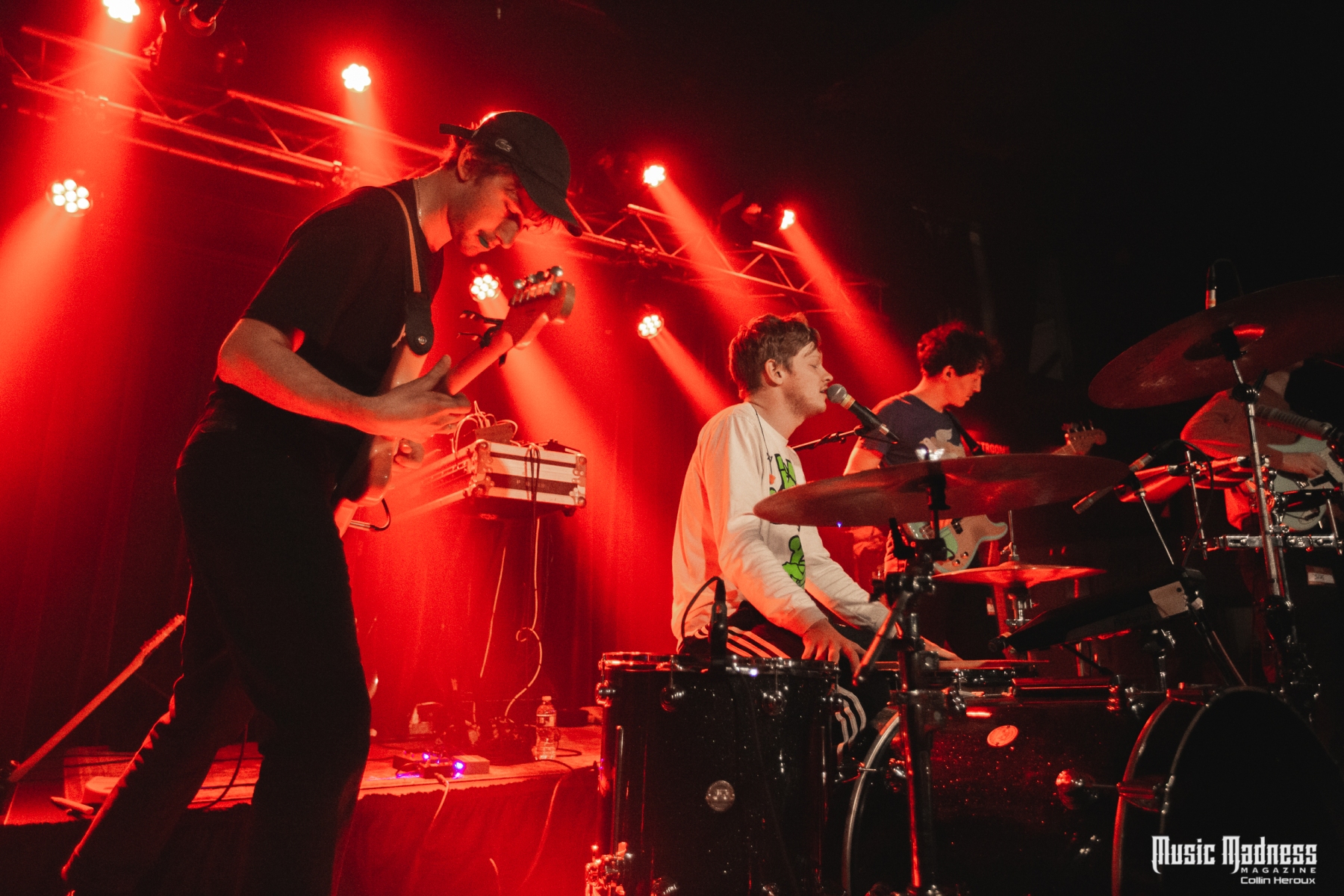
On the heels of an excellent EP and some stray singles that only heightened anticipation, UK art-post-punk-insert-amorphous-genre-description-here virtuosos Squid finally released their debut album in 2021, the multifaceted and always-exciting Bright Green Field. They’re part of a new class of UK innovators that have taken off to a huge degree on both sides of the pond, including recognizable names like Black Midi, Dry Cleaning, and Yard Act – the last of whom are actually playing just across the Charles River in Cambridge on the same night Squid tackles Boston proper. The band, none of whom are out of their twenties, exemplify an exciting future overflowing with new ideas, and there’s plenty of the distinctive under-21 Xs on hands hanging over the barricade in Boston, the crowd packed tight in rows close to the stage, a mass of people that’ll soon be bouncing up and down against one another to frantic rhythms.
Situated in the center of the stage is a drum kit, far more prominently placed than one sees in most bands. That owes to the fact that lead vocalist Ollie Judge is also Squid’s drummer, a pair of roles not commonly shared, but the synthesis of which is one of the driving factors in the band’s sound and composition. In total control of pace and intensity, his playing has removed a step of translation present in other bands when vocals and rhythm are more bifurcated. His singing too is distinctive, liable to turn into an unexpected upward inflection at just about any moment, as if applying the same unpredictability he uses in drumming to his pitch.
Judge is accompanied by his four bandmates, all of whom paint with many brushes in the creation of their sound, bringing in at times wailing guitars, others swinging horns that hearken back to their roots playing in jazz clubs. Seeing the band live, there’s a lot of that improvisational air around, and songs gain extended intros, outros, and interludes that help the night flow together seamlessly, bending as-yet-unreleased tracks like ‘Nines’ and ‘Fugue’ around songs like ‘Peel St.’ that fans have been listening to for nearly a year.
Bright Green Field engages often with the subject of capitalism, though it does so at oblique angles steeped heavily in literary references. ‘Peel St.’ in particular is like this; its chaotic start and middle are rife with total uncertainty that could certainly be attributed to the current state of the world, but then its narrator finds themselves “free”, Judge’s vocal delivery conveying a quiet disbelief at that fact. It’s hard to tell where his writing starts and the references to 20th-century author Anna Kavan end, the title of the track derived from the street on which she made her home before dying. Perhaps fully decrypting it isn’t the point; it’s exciting enough as the ragged guitar strums and synth patterns sound like the listener is barreling through a tunnel surrounded by blaring klaxons and flashing red lights before being thrust out into a somehow-more-unsettling sonic emptiness.
Though much of the band’s material in this live set comes from Bright Green Field – itself named after a Kavan work – they also deign to play ‘Sludge’, a non-album single that finds someone wrapped up entirely in a sedentary existence. This touchstone anyone can appreciate, bored and lying on the bed as the soft light of a computer or phone screen lulls them to a state of catatonia. The song is anything but lethargic though, bassist Laurie Nankivell’s winding riff carrying its opening while Judge’s drumming begins more minimalistic – but at the moment the protagonist seems to take a stand against this status quo, guitarists Anton Pearson and Louis Borlase come in from both sides and swallow the song in noise and Judge’s drumming activates in full. Despite counting themselves among the least structurally conventional bands around, if there’s one thing Squid likes to do somewhat often it’s a big finish, where once-disparate parts cohere together in a massive crescendo. Standouts like ‘Pamphlets’ and ‘Narrator’ from Bright Green Field follow this trend and the sound of all five players going fast and loud never ceases to energize.
Speaking of ‘Pamphlets’, one of the only points in the evening where the band comes to a full stop is after that song in the midpoint of the night, where Judge asks the ebullient crowd if everyone’s alright, his demeanor calm and collected, voice steady and almost soft, a polar contrast to many of his verses. But it’s only a brief pause, and soon they’re on to ‘Boy Racers’ and another one called ‘Sevens’, though like as not this is a codename for a track to be properly christened later. From here, there’s one of those extended periods of improvisation that doesn’t really make sense on a record but thrives in the live environment, as ‘Documentary Filmmaker’ extends into a long interlude where the band plays around a bit. Judge rises from his seat for the first time, walking around the front of the stage, taking a drink of water, but staying in striking distance of his cymbal or tom at all times whenever he feels compelled to return.
This breathing room is perhaps a substitute for the traditional encore break, as what follows is the one-two punch of BGF’s best songs, ‘G.S.K.’ and ‘Narrator’. The former is one of the band’s more literal works, and Nankivell takes up a trumpet and with a golden instrument provides what can only be described as a downright-sleazy brass stinger that pairs perfectly with Judge’s visual of a golden sun setting on the reflective exterior of the GlaxoSmithKline skyscraper in the UK. Backed with string-like synths reminiscent of a movie intro, one can imagine the camera panning down the side of the building to find Judge “speeding along” in a montage set in a world absolutely littered with, and encumbered by, the trappings of corporatization. A disembodied voice joins him in the closing, broadcasting portents of the mundane in a world that seems too far gone to change.
By contrast, ‘Narrator’ is more personal, the frightening interplay of two psyches where one, the unreliable narrator of the title, tries to supplant the other’s identity. It’s a long song, much of it mantric repetitions of “I’ll play my part” as the instruments become more unhinged around Judge’s constant beat, and by the end, the guitars and keyboardist Arthur Leadbetter generate so much chaos that it seems to break Judge’s narrator and his voice ratcheting up intensely as the song comes to its instrumental conclusion. There’s a silhouette of a crowd-surfer being hoisted high in the air through the music hall and after vamping on the final passage for a while the band brings the set to its thrilling close and the room is joyous and pleasantly exhausted.
If there’s one thing Squid have demonstrated thus far in their career, it’s that they are unwilling to ever be boxed in, not from the myriad, esoteric inspirations for their lyrics, to the song structures they use and deconstruct and rearrange constantly. Their songs tend to be long for good reason: nobody quite crafts a morphing, soaring odyssey quite like Squid – a fitting creature from which they take their name, ten arms reaching in many different directions, capable of bringing together a host of different parts to a fascinating whole.
Review and photos by Collin Heroux

